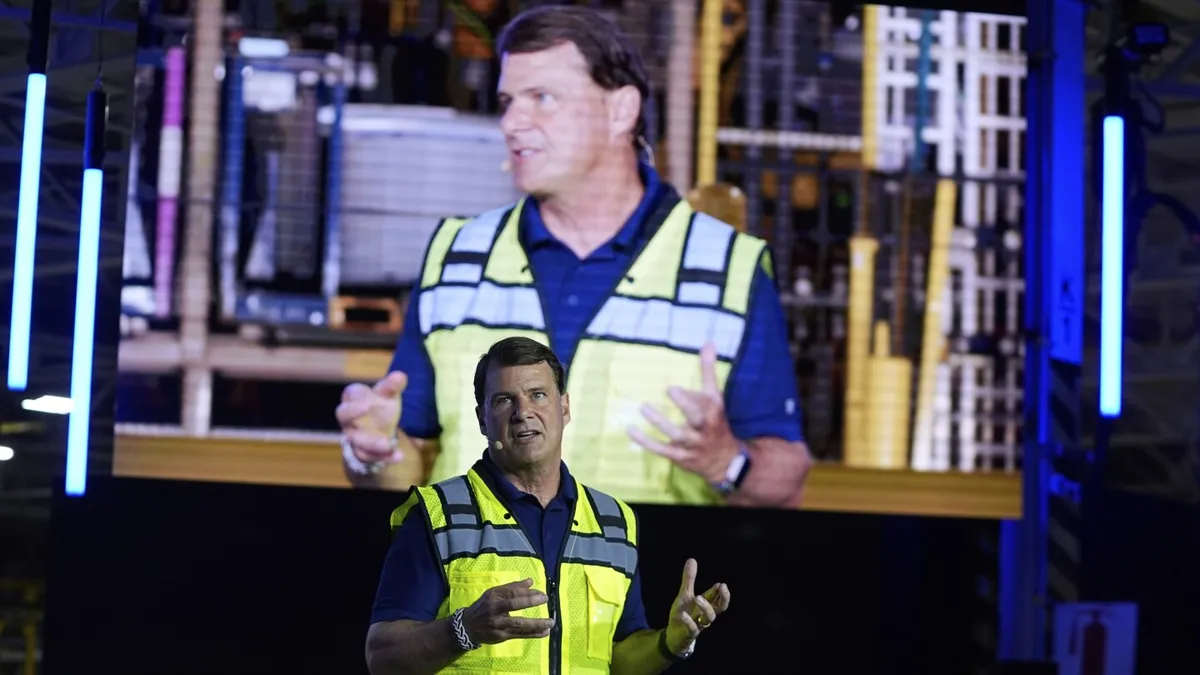
LOUISVILLE, Ky. — Ford Motor Co. has announced a significant investment of nearly $2 billion to retool its Kentucky factory, aiming to produce electric vehicles (EVs) that are not only more affordable but also more profitable to manufacture. This bold new EV strategy was unveiled by CEO Jim Farley at Ford’s Louisville Assembly Plant, which has been dedicated to producing gas-powered vehicles for over 70 years. The transition marks a pivotal moment in the company’s history as it shifts towards electric vehicle production.
“In our careers, as automobile people, we’re lucky if we get to work on one, maybe two, projects that really change the face of our industry,” Farley remarked to plant workers on Monday. “And I believe today is going to light the match as one of those projects for all of us here.” This announcement underscores the automaker's commitment to leading the transition from traditional internal combustion engines to innovative EV technology.
The shift to electric vehicles comes even as the political landscape evolves, particularly with the Trump administration rolling back incentives designed to encourage automakers to electrify their fleets. The recent tax and spending laws target EV incentives, including the impending removal of a credit that can save buyers up to $7,500 on new electric cars. Despite these challenges, Farley and other industry leaders emphasize that the future of transportation is electric, and there is no turning back.
The first electric vehicle to roll off the revamped assembly line in Louisville is set to be a midsize, four-door electric pickup truck, expected to launch in 2027 for both domestic and international markets. Ford has also disclosed that these new electric trucks will be powered by lower-cost batteries produced at a dedicated factory in Michigan, part of a previously announced $3 billion investment into battery production.
Farley describes this venture as a “Model T moment” for Ford’s electric vehicle business, referencing the transformative changes initiated by the company's founder, Henry Ford, over a century ago. “It represents the most radical change on how we design and build vehicles at Ford since the Model T,” he stated. The new production strategy entails the use of a universal platform and production system for EVs, which allows for flexibility across a variety of vehicle models.
The Louisville factory, one of two Ford assembly plants in Kentucky’s largest city, will undergo significant upgrades to enhance efficiency and cut production costs. This transformation is aimed at making electric vehicles not only more affordable but also profitable. “This is an example of us rejuvenating our U.S. plants with the most modern manufacturing techniques,” Farley added in an interview with The Associated Press.
Ford's new platform is designed to facilitate the production of a range of affordable electric vehicles at scale. The company anticipates a reduction in parts by 20%, with 25% fewer fasteners and 40% fewer workstations, while also achieving a 15% faster assembly time. The traditional assembly line will be innovatively transformed into an “assembly tree”, where three sub-assembly lines will operate simultaneously and later join together.
Details regarding the midsize electric truck, including its reveal date, starting price, EPA-estimated battery range, and charging times, are expected to be announced later. However, Ford has indicated a targeted starting price of around $30,000 for this new electric model.
The investment in the Louisville plant is poised to secure 2,200 hourly jobs. Kentucky Governor Andy Beshear commented on this development, stating, “This announcement not only represents one of the largest investments on record in our state, but it also boosts Kentucky’s position at the center of EV-related innovation and solidifies the Louisville Assembly Plant as a crucial part of Ford’s future.”
The combined investment of approximately $5 billion at both the Kentucky assembly plant and the Michigan battery plant is anticipated to create or secure nearly 4,000 direct jobs between the two facilities while bolstering the domestic supply chain with numerous new U.S.-based suppliers.
Despite facing challenges, including previously forecasted weaker earnings growth and losses in its electric vehicle sector, Ford is determined to redefine its future in the EV market. The company’s Model e division reported a full-year loss of $5.08 billion for 2024, with revenues falling 35% to $3.9 billion. As competition intensifies from Chinese automakers offering affordable electric vehicles, Farley insists that Ford's focus is not merely on volume but on establishing a sustainable and profitable electric business that resonates with customers. “This new vehicle built in Louisville, Kentucky, is going to be a much better solution to anything that anyone can buy from China,” he concluded.